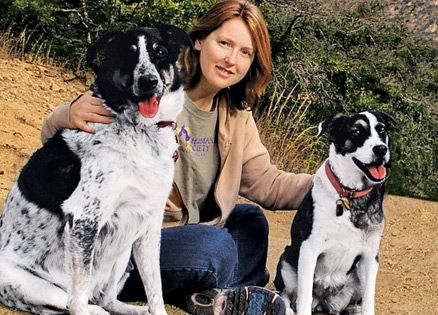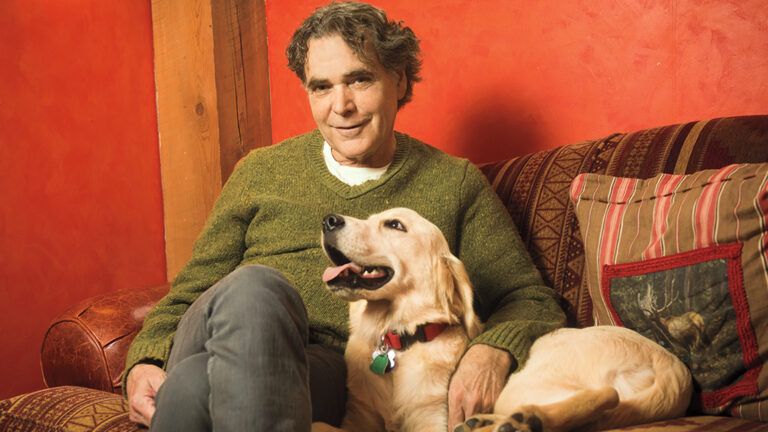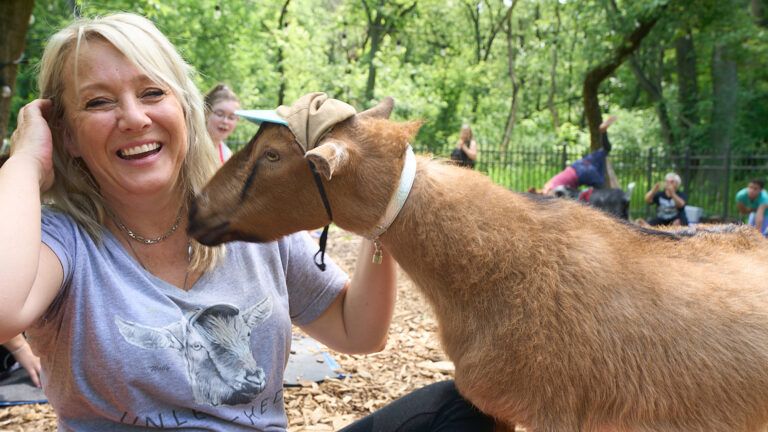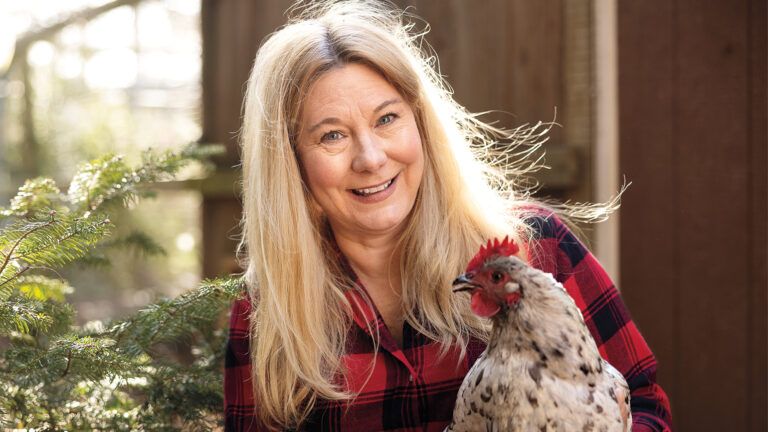You’ve heard of Petfinder.com—a website that helps shelters and rescue groups find loving homes for animals?
Maybe you even found your own pet through the site—we’ve facilitated more than 13 million adoptions.
But did you know Petfinder started as an inspiration that came out of the blue on the way to a New Year’s dinner?
As a kid I’d volunteered with a rescue group, but as an adult, I’d turned to a career in natural resources. Until that night, I had no idea I was about to get involved in pet adoption again.
Back in 1995 Google wasn’t a verb and Facebook didn’t exist. The world wide web was more of a wild world.
My husband, Jared, and I weren’t dot-commers. He was beginning his medical residency and I worked for New Jersey’s urban forestry. But we were intrigued by the sense that anything was possible on the web. We just didn’t think it was being used effectively.
The question was, what would benefit from its fantastic search capabilities? That’s what we were discussing in the car that night on the way to meet friends for dinner. The site we were dreaming of would be searchable, sortable and colorful.
We tossed around ideas. Maybe real estate listings? But that didn’t seem right. If we were going to try to use some of this new digital power, it should be worthwhile. “The ultimate website would harness technology for a socially responsible cause,” Jared said.
I nodded. We fell silent. What cause needed our help? Then we both said, in unison, “What about animal shelters?”
I got goose bumps when I thought of all the lives we could save. What were the chances the same inspiration would strike us at the same instant?
Sure, we loved animals and I’d “rescued” them when I was a kid (like the snake I found in the backyard and convinced my parents to let me keep), but now my focus was on planting trees and building green spaces in cities and Jared’s was on healing the sick. We didn’t even have a pet. Yet I knew every year, millions of abandoned pets—healthy, loving animals who wanted only for a home—were killed.
We couldn’t wait to tell our friends our idea. They volunteered to help.
Jared and I worked on Petfinder.com—that’s what we named it—whenever we weren’t at our jobs. He did the programming and I designed the site. Our friends helped spread the word to shelters.
Animal-welfare groups are usually strapped for funds, so we wanted the site to be free to them and to potential adopters. That meant all expenses came out of our pocket. But we knew if we saved just one life a month, it would be worth it.
We launched the site with 13 shelters. I entered all the data because most shelter folks didn’t have access to the internet.
It was odd for the Petfinder creators to be without a pet, but that didn’t last long.
One morning a few months after we launched, I was on my way to work, walking to the train station, when I had my purse snatched—by a dog. Off he ran. I followed and retrieved it—and him, using my purse as a leash (he wouldn’t let go). The dog seemed to be on his own, so I called Jared. He picked us up.
This was our first chance to use our site ourselves. We checked with shelters to see if anyone was looking for him. Then we posted him on Petfinder, named him Max and prepared to interview prospective adopters.
We discovered how effective Petfinder was. Soon we heard from several interested people. But none seemed right.
“I’ll take him,” one man said. “He’s used to living outside. Perfect for guarding my junkyard.” Used to living outside? I don’t think so. That’s when I realized we’d already found Max a home—ours!
In those early days, my biggest struggle was hearing heartbreaking stories about abused or abandoned animals. The pup who was left tied to a lamp post in a thunderstorm. The dog who almost ran into traffic trying to escape some mean kids throwing rocks at him.
Because of his physician’s training, Jared was able to keep his emotions somewhat apart from the work. But me, I’d go from outrage to sorrow to helplessness as I put up dogs’ photos on our website. Could our efforts make a difference when there were so many animals in desperate need?
Then a few months into our project, something changed. Somehow my perspective shifted. I started to see the hopeful side of those sad stories, like the woman who chased off the mean kids and coaxed the dog into her car, or the vet who stayed after hours to patch up a street cat who’d been injured, or the family who adopted an abused dog and lovingly taught her to trust again.
Or the wonderful community in Bowling Green, Kentucky, that helped a stray dog with a broken jaw. A police officer carried him off the street to the humane society, which posted him on Petfinder. A veterinary dentist donated his services. A woman in another state saw the Petfinder posting and knew her friend in Ohio would be the perfect owner. Once the adoption was arranged, a chain of volunteer drivers took the dog to his new home.
Finding the heroes in those situations—and there always are—was empowering. It reminded me that no matter how small, every action a person takes to help one of God’s creatures has an impact. And that when we put together all the pieces each of us works on, we can make a big difference.
There was one thing, though, about Petfinder I didn’t understand—the idea that you could see an animal’s picture and know you were meant to be together.
“It was love at first sight!” I kept hearing from happy new pet owners, like the couple who drove from Florida to Michigan to adopt a black cat they saw on our site. I assumed Petfinder would be like the Yellow Pages, but you’d still need to meet your new pet to fall in love.
That is, until about a year after we started Petfinder. I was going through some incoming adoption lists when a photo of a big, spotted mutt named Kobie made me stop short. I couldn’t turn away from his face looking out from behind the bars of a crate in a shelter in Harlem.
He was a year old, but he had the eyes of an old soul. I know you, I thought. I called the shelter. Kobie was scheduled to be euthanized at five o’clock that day. I’d never make it there in time.
The woman at the shelter proposed a deal: “I’ll put Kobie in my Jeep and meet you halfway…but you have to take two other dogs that are going to be euthanized today.”
What am I getting myself into? But it was too late. I’d made up my mind the second I saw Kobie’s photo. Jared wasn’t so sure, but we drove to the halfway point and piled the dogs into the car.
Friends fostered the other two, and it didn’t take long for Kobie to become a part of our family.
Two years later our site went national. I left forestry to devote myself to it full-time. Today, more than 12,500 animal welfare groups post animals on Petfinder; 65 percent of animal adoptions in the U.S. come through the site, including most of the animals on my farm in North Carolina.
Max and Kobie have passed on, but I live with three horses, seven chickens, a guinea hen, two goats, a sheep, two guinea pigs, two cats and a dog.
Helping animals find homes isn’t always easy, but it’s what I was meant to do. Every day I’m reminded we’re all connected in ways beyond our imagining.
Maybe it goes back to what first struck me about the web, that anything is possible. I hear so many stories like Max and Kobie’s, and well, with over two million adoptions a year…let’s just say I get a lot of goose bumps.




